Peter MALONE
Saturday, 09 October 2021 13:01
Marathon: The Patriot's Day Bombing
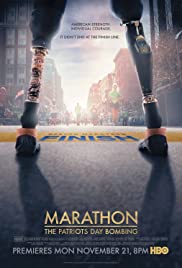
MARATHON: THE PATRIOTS DAY BOMBING
US, 2016, 108 minutes, Colour.
Directed by Ricki Stern, Annie Sundberg.
This documentary for American television goes back to the Boston Marathon on, 2013, the crowds of spectators, the fine day, the many running, the two explosions which killed four people and injured hundreds of others. The film incorporates a great deal of actual footage, of Boston that day, of the crowds gathering, of the race itself, of the explosions, close-ups of the injuries and the on the ground treatment, examination of footage to highlight the presence of the bombers… This is all skilfully put together.
While this is a film about inhumanity, the story of the bombers, well explored and dramatised, is not at the centre. This is a film about humanity, a focus on three families of survivors – staying with them over a period of several years, especially for their medical care and rehabilitation as well as the spirit of survival and possibilities of hope.
As regards the bombers, the narrative about them is inserted into the broader narrative of the survivors. There is the quick identification of the bombers, explanation of their presence in the United States, the family’s origins in Dagestan, the dysfunctional family, the sports activities of the two men, the older brother and his educating his younger brother, yet the independence of the younger brother. Background is filled in of the pursuit, the death of the older brother, the younger one hiding on the boat, his being arrested, the background of the building of the bombs, the ideology, she Hardy mentality, imprisonment, the court case and the death sentence.
However, as has been said, the focus is on the better aspects of human nature. The three key families are introduced at the beginning of the film, where the audience may or may not know about the ordeals and the lives of the survivors. The focus of the film is certainly on two brothers who were injured, then on a family with the mother and daughter injured, and then an engaged couple.
Most of those who are seen in close-up, with the background of their family members, lost one limb, some of them losing two legs.
The film shows a great deal of the hospital treatment, the surgery, close-ups of the injuries, the prospects – and the support of the family.
A great deal of attention is given to prosthetics, the developments and possibilities of artificial limbs, the attention needed to enable those with the limbs to attach them, to make them flexible, to be able to use them, to walk, even to run. The engaged couple were also taken in, not the usual entry, to the water Reed centre for disabled veterans. The couple welcomed, participated in the activities, made friends with many of the veterans, the other man, Patrick Downes, eventually able to go into a marathon for the disabled, his girlfriend watching him from her wheelchair. She is particularly strong because she lost both legs. And this is true, of the story of a mother and daughter, especially where the mother, Celeste Corcoran, lost both legs and participated in a strong recovery.
The film serves as a record of the tragedy itself, of the resilience of human nature, and a close-up of medical care, surgery and rehabilitation.
The year after this film was screened, David Gordon Green directed Stronger, based on a memoir by another victim, Jeff Bauman. Later, Mark Wahlberg starred in a recreation of the events and the pursuit of the bombers, Patriots Day.
Published in Movie Reviews
Published in
Movie Reviews
Saturday, 09 October 2021 13:01
Vivarium
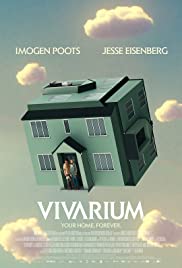
VIVARIUM
Ireland, Denmark, Belgium, 2019, 97 minutes, Colour.
Imogen Poots, Jesse Eisenberg, Jonathan Aris, Senan Jennings, Eana Hardwicke.
Directed by Lorcan Finnegan.
It is probably useful to check on a definition of the title word, one that is not normally used in frequent conversation.
A vivarium (Latin, literally for "place of life"; plural: vivaria or vivariums) is an area, usually enclosed, for keeping and raising animals or plants for observation or research. Often, a portion of the ecosystem for a particular species is simulated on a smaller scale, with controls for environmental conditions.
And there is some further precision: A vivarium may be small enough to sit on a desk or table, such as a terrarium or an aquarium, or may be a very large structure, possibly outdoors.
While we are wondering about the title, the film opens in a pleasantly ordinary way. Gemma (Imogen Poots) is a successful kindergarten teacher. Tom (Jesse Eisenberg) works on trees and gardening. Off they go to a real estate agent, testing the possibility of buying a house together.
There is an alert with Martin, the agent, behaving in a puzzling and robotic way. He persuades them to go with him to examine the house – while the interiors seem very suitable, we sense a tension when there are rows and rows of streets with identical, identical homes. So, this is what a suburban Vivarium could look like.
And then, there is a growing sense of menace, as Martin disappears, as the couple get in their car, drive to leave, find themselves continually going in circles, arriving again at the house, No 9, eventually running out of petrol, then walking in circles, finally stranded.
Gemma and Tom are trapped in this suburban Vivarium. How will they cope? Food appears outside the front door in boxes, delivered anonymously. Then a baby is delivered. Then a patch of soil appears on the front lawn and Tom begins to dig, to dig, to dig, deeper and deeper, keeping himself occupied, but becoming obsessed. In the meantime, Gemma tries to manage with the baby.
If audiences want to know what happens with the baby – and quite a lot does, highly dramatic, increasingly menacing…, then see the film.
No explanations are given. There is no indication as to who is controlling the experiment and observing in this Vivariuim. How significant are our speculations as to this image of never-ending streets and houses as a symbol of our contemporary world? Is there no control? And what of any indications of transcendence? Any place for God…?
Gemma experiences the equivalent of a nightmare during the day, all the inhabitants of the houses trapped in the Vivarium. Life and death? No escape?
The screenplay does not spell out answers for audiences who want something clear at the end. It is over us to continue our responses, increasingly alarmed, increasingly pessimistic.
1. The title? A special construct for observing humanity and behaviour? The maze, the houses and streets, the repetition? A couple literally buried alive?
2. The Irish settings, the town, the school, the estate agent? The streets in the countryside, the welcoming poster? The repetition of the streets, the repetition of the houses? The current the street? Driving through the maze and getting lost? Number 9? The interiors of the house? The ever deepening hall? The musical score?
3. The introduction to Gemma, teaching the small children, her joy, the little girl at the dead bird, knocking on the tree, Tom and his working? They’re going to the agent?
4. Martin, robot -like, his explanations, persuasion, driving the couple to the house, his steel in the house, the advantages of the house, his disappearance?
5. The couple, escaping, driving, continually going in circles, running out of petrol, exhausted, walking, lost? The box of food in the street? The message about that caring for the boy? The baby in the box? The reactions?
6. The sudden growth of the boy, from baby to boy? His manner, robot-like? Claiming Gemma and his mother and her refusing? His capacity for mimicking Gemma and Tom? His screaming? Watching the patterns on the television set? Going to bed, never dreaming?
7. Tom, the cigarette, burning the grass, the earth and patch, his digging and continuing to dig, the depth of the whole? Having something to do? Gemma, in the house, the care for the boy, his demands, mimicry, saying she was not his mother?
8. Time passing, the repetition, the boy growing older, the same experiences?
9. The boy growing up, Martin, his manner, clothes, in the house, the exasperation of Gemma and Tom? His disappearances? Gemma following him and getting lost? The continued boxes?
10. Tom, his weariness, discovering the body and the tarpaulin in the whole? Gemma calling out, coming to him, his final words, his death? Martin appearing? Putting the body in the Shroud, down the hole?
11. Gemma pursuing Tom, his lifting the pavement, the world underneath, mysterious, the woman at the table, beloved makers, the dead man in the bar…? Gemma emerging, Martin and his treatment, in the shroud, her being thrown down the hall?
12. Martin, returning to the shop, the next couple and the repetition?
13. The twilight zone experience, metaphors for existence, limbo, death?
Published in Movie Reviews
Published in
Movie Reviews
Saturday, 09 October 2021 13:01
Agatha Christie's Poirot Murder in the Mews

MURDER IN THE MEWS
UK, 1990, 50 minutes, Colour.
David Suchet, Hugh Fraser, Philip Jackson, Pauline Moran, Juliette Mole, David Yelland, James Faulkner.
Directed by Edward Bennett.
This is the second episode in the television series of Agatha Christie mysteries featuring David Suchet as Poirot.
The locations of the mystery are not exactly exotic – except for the murder being committed on Guy Fawkes’ Day with fireworks, and fireworks possibly concealing the sound of a gun firing. But, the story is quite suburban, murder in the Mews.
Captain Hastings is present and Chief Inspector Japp is called in. There is a mystery about a dead woman and whether she was murdered or committed suicide, or the situation arranged to suggest murder and for the incrimination of a blackmailer.
Although there is, as always, a twist, this is a more conventional, suburban Poirot mystery.
1. The popularity of Agatha Christie’s mysteries? The television series with David Suchet as Poirot?
2. London setting? I thought? The fireworks? The sounds disguising the gunshot? The involvement of Chief Inspector Jack? Poirot and Hastings and their involvement?
3. The situation, the dead woman in the flat, seeming suicide, the gun in the wrong hand?
4. Jane, the return to the flat, finding Mrs Allen? The friendship? The background? Laverton West? Maj Eustace?
5. Poirot and the interrogations? Suspicions? Murder or suicide? Jane and her friendship, concern? The strong issue of who was left-handed and right-handed? The gun? The other clues?
6. Laverton West, involvement?
7. Major Eustace, his involvement, his cigars, the incriminating evidence? His being upstairs? His denials?
8. The serious theme but the comedy background, Ms lemon and her discussions with Poirot about dentists, laundry?
9. Poirot and the solution, the suicide made to look as if it were murder in order to put the blame on Major Eustace?
Published in Movie Reviews
Published in
Movie Reviews
Saturday, 09 October 2021 13:01
Agatha Christie's Poirot Lost Mine
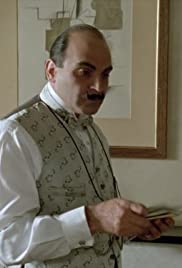
THE LOST MINE
UK, 1990, 50 minutes, Colour.
David Suchet, Hugh Fraser, Philip Jackson, Pauline Moran, Anthony Bate, Colin Stinson, Barbara Barnes, James Saxon, Vincent Wong, Julian Firth.
Directed by Edward Bennett.
This is one of the earliest of the television series of Agatha Christie mysteries with David Suchet as Poirot. It is set in the world of banking – opening with some comic touches where Poirot has difficulties with his account and reacts demandingly (only to be correct at the end by Miss Lemon).
The film also has Chinese connections, the loss of a mine in China and the recovery of its map to find its whereabouts. There is a visiting Chinese man with an appointment for financing and deals with the bank. There is an American connection leading to Chinatown an opium den and gambling. There is also the head of the bank, highly respectable, who is eventually unmasked.
All the usual ingredients of a mystery, murders, Poirot and his explanations.
1. The popularity of Agatha Christie’s mysteries? Television series with David Suchet as Poirot?
2. This film as a short story, the focus on finance, Poirot and his banking difficulties? The companionship of Hastings and involvement with the solution? The connections with Scotland Yard and Inspector Japp? Miss Lemon and her investigations?
3. Poirot, his dealings with the bank, his demands? The later revelation of his not banking the cheque? His precision about the amount of money in the bank?
4. The story of the Chinaman? His registering at the hotel? The background of the mind, silver, the sample? The mine lost? A map? The meeting with the bank? His meeting with a stranger and disappearing? His death?
5. The bank, the board, Lord Pearson, searching for the Chinese? Engaging Poirot’s help?
6. The visits to Chinatown, the opium dens, Reggie Dyer, the chief inspector and the surveillance, arresting Dyer, the interrogation, his getting off, later tracking him down to the opium den? His arrest? His associates?
7. The information about Charles Lester, American background, his business, his denials? His wife’s concern? His opium addiction?
8. Poirot, the interrogations, Chief Inspector Japp? The information about Lord Pearson, his gambling, Chinatown, his masterminding the murders?
9. A local London story, Poirot and Japp and the solution?
Published in Movie Reviews
Published in
Movie Reviews
Saturday, 09 October 2021 13:01
Ma
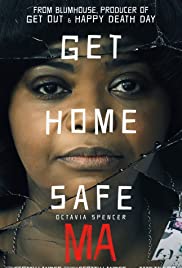
MA
US, 2019, 99 minutes, Colour.
Octavia Spencer, Juliette Lewis, Diana Silvers, Mc Kaley Miller, Corey Fogelmanis, Gianni Paolo, Dante Brown, Tanya Waivers, Luke Evans, Missy Pyle, Alison Janney.
Directed by Tate Taylor.
Ma sounds a kind of folksy ingratiating name for mother or a mother-figure. And, when we are introduced to her and find she is being played by that fine character actress, Octavia Spencer, we might expect something genial.
But then some will notice that this is a Blumhouse production and Blumhouse is best noted for thrillers, and a lot of horror stories. And, this is the direction in which Ma (both the character and the film) takes us. However, unlike many of the Blumhouse productions, there is nothing supernatural in this plot. This is a focus on the complexities of human nature.
Ma is Sue Ann, getting older, living at home, working as a vet (with Allison Janney as her boss in a rather low key cameo role). However, the initial focus is on a mother and daughter, Juliette Lewis and Diane Silver, the mother returning to the town where she grew up. She gets a job in a casino. The daughter goes to school where she encounters a group of friendly students (who, surprisingly, remain her friends throughout the film despite all the ups and downs, especially the final downs).
However, they have a touch of the rebellion in them and want to buy some alcohol and, encountering Ma walking a dog, they enlist her help. Not only does she help, but she invites them to the basement of her house where they can party. They take up the invitation. Ma is exhilarated and enters more and more into the partying.
Of course, it all becomes quite complex. There are flashbacks to Sue Ann when she was at school and bullied. There is the discovery that she has a daughter whom she protects. And, some of the parent generation in the present worth the bullies from the past.
As the behaviour becomes more and more sinister, and Ma is threatened, the screenplay moves towards some violence and cruelty, some mad and deadly manifestations.
It is interesting to watch Octavia Spencer as Sue Ann, genially dealing with the youngsters, but becoming more and more possessive, even deranged.
Not everybody’s choice for entertainment, but in its way, drawing us in.
1. The title? Expectations? Sue and, her befriending the teenagers, giving them hospitality, enjoying their company, their calling her Ma? The revelation about her own daughter and her treatment of her? Possessive?
2. The story about a small town, the teenage generation, school, drinking, friendships? Background families? The older generation and their links? Moving into a greater sense of menace, violence?
3. The atmosphere of the town, small, Erica and Maggie moving in, Erica and her job at the casino, the style of the casino? Maggie, school, making friends, the outings, the liquor shop, the vets, Ma’s Place, the cluttered basement, the austere upstairs? The musical score?
4. Erica, her background in the town, the failed marriage, returning with Maggie, her job at the casino, Stu and his help, the encounter with Ben and Mercedes? Her concern about Maggie? Maggie and her age, loyal to her mother, at school, Haley and the invitation, the challenge to buy the liquor, the encounter with Ma, accepting her hospitality, the parties and the basement? The attraction towards Andy? The back stories? Her deceiving her mother, her mother and her demands?
5. Sue Ann, working at the vet, reprimanded by the boss, seemingly absent-minded, walking the dog, buying the liquor, bonding with the young people, offering the basement, her becoming involved in the parties, dancing, the drinking? Her growing dependence on the young people? The stealing of the jewellery? Further making demands, Haley and her cutting the group off from Ma? Ma and the technology, the phones, researching each of the teenagers?
6. The flashbacks, Sue Ann at school, glasses, persecuted and ridiculed? The attachment to Ben? Her phoning Ben about Andy and the drinking? (And the police arriving and letting them off?) Ben at the vet, making the appointment with Sue Ann, the hotel, the confrontation and his warning her off? Ben and his relationship with Mercedes, the sex, at the casino? His deceased wife, his son?
7. Genie, at school, shy, friendship with the teenagers? Her mother keeping her at home, her illness, upstairs? Her mother possessive and demanding? Her wanting to go downstairs?
8. The buildup to the confrontation? The young people arriving, Sue Ann barring the exit? Maggie going to the basement? Sue Ann, madness, the previous making the boy strip naked, sewing Haley’s lips, stabbing Andy, painting Dante white? Her abduction of Ben, naked on the bed, threatening the castration?
9. Erica, her concern, Stu and his help? Going to rescue Maggie? Genie coming down, attacking her mother? The rescue? The fire, Sue Ann going upstairs, lying with Ben? The conflagration?
Published in Movie Reviews
Published in
Movie Reviews
Saturday, 09 October 2021 13:01
Art of Self Defense, The
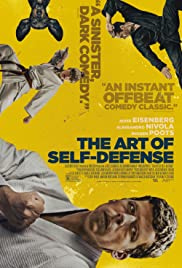
THE ART OF SELF-DEFENSE
US, 2019, 104 minutes, Colour.
Jesse Eisenberg, Alessandro Nivola, Imogene Poots.
Directed by Riley Stearns.
This is a drama about what it means to be male, macho, the elements of being a man in contemporary society. But, the film is full of irony, moments of parody, a critique of ideas and practice of machismo. (Some of the response to the film was very negative because audiences heard it was meant to be comic – but they failed to perceive the inherent ironies funny; others were negative because they saw it as an attack on martial arts.)
Jesse Eisenberg has specialised over the years in portraying nervous, sometimes nerdish characters (even though he did play Lex Luthor in more recent Superman films). Here he is, Casey, a 30 something, working as an accountant, living by himself (except for his favourite pet dog), very awkward in his communication with others. One night he is mugged in the streets and finds himself in hospital, feeling cut off from his work, unwilling to go back to work despite invitations from his boss. He considers buying a gun and goes through the processes of choosing and being interviewed for documentation. But, then he sees the Karate school.
We are introduced to a character, the director of the school, who seems to be a very direct character in his dealings with his students, affirming and challenging. However, as the film progresses, he is the embodiment of the machismo, making further and further demands on his students and, ultimately revealed as an arch controller and manipulator. He is played effectively by Alessandro Nivola. And, he has an enormous impact on Casey, urging him to punch as if he kicked and kick as if he punched.
Complicating the issue is one of the students, female, played by Imogen Poots (who, after this film, co-starred with Jesse Eisenberg in the symbolic Vivarium).
Casey’s experience with the martial arts, straightforward but eventually sinister, transforms him – but into what?
1. The title? The challenge? For devotees of martial arts? For the ordinary audience
2. The American city, Casey’s apartment, the interiors? The offices and workplace? The streets, the dangers? The karate centre, the classrooms, offices, store supplies? Atmosphere and musical score?
3. The film as drama? The film as ironic comedy? Realism, the surreal, the satire?
4. The theme of manliness, male image, characteristics, characters and the touch of the misogynistic? The realism of machismo? The satirical aspects?
5. Casey’s story, Jesse Eisenberg and his screen presence, the touch of the nerd, at home, bachelor, love for his dog, at the office, auditor, the interactions with the men in the discussion about their practical joke, his good relationship with his boss? Timid? Going out the dog food, his being pursued by the cyclists, his being bashed, in hospital, his boss extending leave for him? His return home? Cutting himself off? His boss’s concern and then Casey brushing him off?
6. His decision to get a gun? The discussions with the seller, the seller and all his cautions about children, about guns and dangers, knives? Casey deciding to buy the handgun? The time delay, papers? His changing his mind? Yet the final use of the gun?
7. Walking, seeing the karate centre? Going in, watching Sensei, listening to him, intrigued, the moves, the behaviour of the students? His agreeing to take the initial lesson? Awkward, his presence, weak, yet challenged?
8. Sensei, real name Leslie, his uniform, black belt, conducting the classes, his demands on the students, his philosophy of punching with a kick, kicking with a punch? Self-assurance? His emphasis on the masculine, deriding the feminine? The range of classes, the exercises? Discussions about the night classes? Presence of Anna, and not having a black belt? His interest in Casey, offering him the auditing work? Bespectacled in the office, dominating in the classes? The meticulous rules about the mat, about guns for the weak?
9. Anna, the female present, her conducting the children’s classes, demonstrations, Casey intrigued? Her presence at the promotions? Not being promoted? Asked to move down? Casey thinking that Sensei approved of her? Discovering the truth? Her being humiliated? Her demonstration with the fellow student and her brutal treatment? The dressing room, a back office? The cooling down, her treatment of Casey? The effect on him?
10. The continued classes, the other students, interactions? The student disappointed at his not being promoted, his arm being broken, ousted?
11. Casey, eventually going back to work, Sensei challenging him to be dominant, listening to heavy metal, learning German? His humiliating treatment of the workers? Their accepting it?
12. The yellow belt, his promotion, his pride, his commissioning all the other belts and giving the black belt to Sensei, distributing the other belts? His wanting to wear his yellow belt all the time? Sensei encouraging him?
13. The complexities of Casey’s character, putting on the machismo, yet his sensitivity, especially concerning Anna?
14. The night classes, Sensei and his dominance, the night raids, putting on the helmets, the bikes, the demands on Casey, the accused, outside the bar, drunk, Sensei making Casey attack, brutalise him? Yet throwing it back on Casey that he knew the man was innocent? His travelling with Anna, the confrontation with the policeman, and her being shot in the leg, the brutal bashing? Praise from Sensei?
15. Casey and his realisation that his bashing was a setup, authorised by Sensei who led his team to attack lonely and isolated men, that they would come to the courses?
16. The effect on Casey, the confrontation with Sensei, the challenge to a fight, Casey shooting him? Taking over the class, dominating, the impact on the other students?
17. A heightened drama – with the interspersing of parody to challenge audience ideas about what it is to be male, a man?
Published in Movie Reviews
Published in
Movie Reviews
Saturday, 09 October 2021 13:01
Deadly Expose
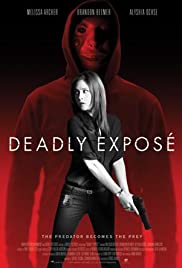
DEADLY EXPOSE
US, 2017, 87 minutes, Colour.
Melissa Archer, Brandon Beemer, Graham Hamilton, Bryan Murphy, Alicia Ochse, Jesse D.Goins.
Directed by Chris Jaymes.
The content and style of this film are familiar. It is the detective investigation of a serial killer, a kind of vigilante who is punishing those who lead double immoral lives.
The detective on the case is Maxine, played by Melissa Archer, absolutely dedicated to her work, partnering with a sympathetic Nick Curtis, played by Brandon Beemer. Maxine is in a difficult relationship with a teacher, Simon, Graham Hamilton. He wants to propose. She puts him off.
The investigation leads to a website where clients can enrol, indulge in their practices, yet have anonymity. Ultimately, they are exposed, leading to a complication with Maxine and her close friend, Jennifer.
There are dangers for Maxine, considering her to be the target of the serial killer, a final confrontation, and unmasking, one of the central characters but who has been fairly unobtrusive.
A short film for those who enjoy detective stories and the tracking of serial killers.
1. Serial killer’s story? Detective story? The personal life of the detective?
2. The city setting, homes, restaurants, shops, police precincts? The locations of the murders? The musical score?
3. The title? The identity of the killer? The unmasking?
4. The first murder, the caravan, the hanging? The interrogation of the victim’s wife, her being a suspect? His reputation? The website, the exposes of people and their immoral lives? The video clips, to the police, the masked killer? The second murder, sadomasochism, whipping, the hypocritical preacher? His disbelieving wife?
5. Maxine, complete dedication to her work, Nick Curtis as her partner? Jennifer and Greg as her friends? The party? The friendship with Jennifer, from the past, ambiguous, Jennifer and her hitting on Graham? Maxine on Graham together, his wanting to marry? Her putting him off? The revelation about her previous marriage? Ryan, his work in the department, challenging her? His stand up to Graham? His being discovered dead?
6. Officer in charge, the FBI intervening? Maxine, her own investigations? The tensions with Graham? His wanting to make up to her, buying the dress…?
7. Nick Curtis, his character, support of Maxine? The fears that the killer was targeting Maxine?
8. Maxine and her contact with the manager of the website, the manager of the agency and the anonymity of her clients? Exposed on television? Her being murdered? The revelation about Jennifer? Maxine and her disbelief?
9. The final summons, Maxine confronting the killer, the revelation is that it was Greg, his abducting Jennifer? Confrontations, shooting?
10. Maxine, reconciled with Graham, learning a lesson, becoming more human?
Published in Movie Reviews
Published in
Movie Reviews
Saturday, 09 October 2021 13:01
Double Expose

DOUBLE EXPOSE
US, 2017, 87 minutes, Colour.
Melissa Archer, Brandon Beemer, Graham Hamilton, Bryan Murphy, Alicia Ochse, Jesse D.Goins.
Directed by Chris Jaymes.
The content and style of this film are familiar. It is the detective investigation of a serial killer, a kind of vigilante who is punishing those who lead double immoral lives.
The detective on the case is Maxine, played by Melissa Archer, absolutely dedicated to her work, partnering with a sympathetic Nick Curtis, played by Brandon Beemer. Maxine is in a difficult relationship with a teacher, Simon, Graham Hamilton. He wants to propose. She puts him off.
The investigation leads to a website where clients can enrol, indulge in their practices, yet have anonymity. Ultimately, they are exposed, leading to a complication with Maxine and her close friend, Jennifer.
There are dangers for Maxine, considering her to be the target of the serial killer, a final confrontation, and unmasking, one of the central characters but who has been fairly unobtrusive.
A short film for those who enjoy detective stories and the tracking of serial killers.
1. Serial killer’s story? Detective story? The personal life of the detective?
2. The city setting, homes, restaurants, shops, police precincts? The locations of the murders? The musical score?
3. The title? The identity of the killer? The unmasking?
4. The first murder, the caravan, the hanging? The interrogation of the victim’s wife, her being a suspect? His reputation? The website, the exposes of people and their immoral lives? The video clips, to the police, the masked killer? The second murder, sadomasochism, whipping, the hypocritical preacher? His disbelieving wife?
5. Maxine, complete dedication to her work, Nick Curtis as her partner? Jennifer and Greg as her friends? The party? The friendship with Jennifer, from the past, ambiguous, Jennifer and her hitting on Graham? Maxine on Graham together, his wanting to marry? Her putting him off? The revelation about her previous marriage? Ryan, his work in the department, challenging her? His stand up to Graham? His being discovered dead?
6. Officer in charge, the FBI intervening? Maxine, her own investigations? The tensions with Graham? His wanting to make up to her, buying the dress…?
7. Nick Curtis, his character, support of Maxine? The fears that the killer was targeting Maxine?
8. Maxine and her contact with the manager of the website, the manager of the agency and the anonymity of her clients? Exposed on television? Her being murdered? The revelation about Jennifer? Maxine and her disbelief?
9. The final summons, Maxine confronting the killer, the revelation is that it was Greg, his abducting Jennifer? Confrontations, shooting?
10. Maxine, reconciled with Graham, learning a lesson, becoming more human?
Published in Movie Reviews
Published in
Movie Reviews
Saturday, 09 October 2021 13:01
Extraction/ 2020
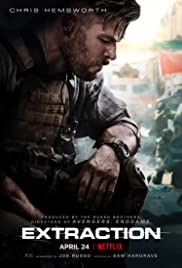
EXTRACTION
US, 2020, 116 minutes, Colour.
Chris Hemsworth,Rudhrakash Jaiswal, Randeep Hooda, Golshifteh Farahani, Piyush Khati, David Harbour, Wayne Blair, Rob Collins.
Directed by Sam Hargrave.
This is a Netflix action show, a star vehicle for Chris Hemsworth moving into real life (or a-fantasy of real-life and military action) away from the Marvel Universe. Hemsworth produced the film. It was written by Joe Russo who collaborated with his brother, Anthony, on the Captain America and Avengers movies. This film was directed by Sam Hargrave who collaborated with the Russo Brothers and has credits for 80 films for his stunt work. It shows in this film.
One wonders whether it was a good idea to open the film with Chris Hemsworth in action but actually being shot, seemingly fatally. Of course, the whole action of the film will build up to this sequence.
The film also opens in India with some affluent schoolboys, especially a young boy called Ovi. The young actor, Rudhrakash Jaiswal, proves himself to be a strong screen presence, sharing a lot of the time with Chris Hemsworth, but creating a credible character. His father is in jail, and affluent gangster. Ovi is abducted by a rival Bangladeshi gangster lord. The father wants his son recovered and asks his manager, the supervisor of his son, to get the boy back, no holds barred.
In the meantime, we are taken to the Kimberleys and introduced to Chris Hemsworth as Tyler, an available mercenary. (And some scenes with Wayne Blair and Rob Collins to give an authentic Kimberleys atmosphere.) His previous connections, especially in the person of Nick Khan (Golshifteh Farahani) arrives to persuade him to take on the case.
After the opening with the wounded Tyler, the caption says two days ago. And, what an exhausting, rather impossible, two days it is. Tyler confronts the captors, shows them why he is a mercenary, takes the boy. What follows is, as expected, all kinds of chases, vehicles crashing, soldiers pursuing, narrow escapes, hiding, using wits… Eventually, there is a dramatic pause with Tyler and the boy bonding, Tyler telling him his life story, giving Chris Hemsworth a chance to act over and above his action skills.
One might say that this is a film for combat-fans. There are many fights, many brutal moments, a huge body count. Which means that the film is targeted for those who enjoy macho action (though there is are some interventions by Niki Khan, including her being a crack sniper).
This is the kind of material made popular by Stephen Seagal or Jean- Claude van Damme. Chris Hemsworth is more credible as an action hero than both of them.
As has been noted, action for combat-fans.
1. The title? Abductions? Rescues?
2. The settings in India, in Bangladesh? The critique from the subcontinent audiences about locations, language, behaviour, details, not appropriate to Bangladesh? Filmed in Thailand?
3. The opening, the military, the combat on the bridge? Tyler, his involvement, the shootings? Wounded? Dying? The reprisal of this sequence at the end?
4. Introduction to the schoolboys, Ovi, with glasses, at school, with his friends, Due and his supervision? Ovi reprimanded? The abduction?
5. In the Kimberleys, the introduction to Tyler, the landscapes, the pool, his diving, sitting contemplating under the water? At home? Nik Khan and her approach? His being a mercenary? Weary? Yet acceptance?
6. The trip to Bangladesh? The team for the rescue? Saju and his visit to the father in prison, gangster? Abducted by a competitive gangster? His control in Dhaka, the colonel, the blockade on the city?
7. Plans, radio communication? The control centre with Nik Khan? Tyler, taken, the confrontation with the tycoon? Turning the tables? His military precision? The deaths, taking the boy, the vehicles?
8. Tyler, in action, combat, the body count? The pursuit, the cars, the guns, snipers, the trucks, in the building, the pursuit? The role of Saju, his wife and child, working for whom?
9. Ovi, in himself, his character, coping with the situation, the bonding with Tyler? The long conversation, Tyler and telling his family story? Ovi and his trust?
10. The stunt work, the camera work, the long continuous sequence, in the truck, the pursuit?
11. The rendezvous of the boat, the hostile forces attacking, the military man watching, his death?
12. Tyler, the escape, Gaspar and the rescue, at his house, the conversations, Gaspar and betrayal, the threats to his wife, the confrontation, the fight, Ovi shooting him?
13. The reconciliation with Saju? The collaboration, getting to the bridge? The tycoon, his self-assurance, his thugs, the treatment of the boy and throwing him from the roof, wanting the other to cut off his fingers? The boy and his loyalty, confronting Tyler, cutting off his finger?
14. The bridge, Nick Khan, sniper, shooting the colonel? The troops, Tyler, being shot by the colonel? Ovi and his escape? Tyler, continuing shooting, on the bridge, falling into the water?
15. The resolution of the case, Saju and his death? Ovi, eight months later, the pool – and the glimpse of Tyler?
Published in Movie Reviews
Published in
Movie Reviews
Saturday, 09 October 2021 13:01
Agatha Christie's Poirot Triangle at Rhodes
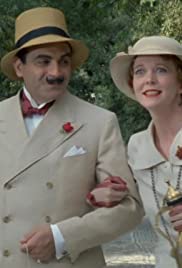
TRIANGLE AT RHODES
UK, 1989, 50 minutes, Colour.
David Suchet, Frances Low, John Cartwright, Annie Lambert, Peter Settelen, Angela Down, Timothy Kightley.
Directed by Renny Rye.
Triangle at Rhodes is one of the earliest of the 70 films on the television series of Agatha Christie mysteries featuring David Suchet. It has a mid-30s setting, holidaymakers on roads, the ferry to Brindisi, the Italian presence, headlines of the invasion of Abyssinia.
Poirot is on holidays which gives the opportunity for some wonderful scenic photography and atmosphere. And the familiar score is played on Mediterranean strings.
The murder and the suspect is limited to 6. However, there is a British Major who enjoys fishing. There is Miss Lyle, who works with Poirot in the investigation and is a substitute this time for Captain Hastings. Which leaves the final two couples – and the triangle which becomes explicit, and the other triangle which explains the murder and the solution.
1. The popularity of Agatha Christie mysteries? The television series with David Suchet?
2. The title, the setting, the beauty of the land and sea, cliffs? Beaches? Hotel, interiors? The musical score (Mediterranean strings)?
3. The Italian Empire, Mussolini, headlines, the invasion of Abyssinia? The ferry to Brindisi? The Italian presence in Rhodes?
4. Poirot on holidays? The encounters with Miss Lyle? Saving her from the Major? The conversations, the commentary on the guests? The investigation, going to the wharf? Her taking the place of Captain Hastings?
5. The Chantrys? Wealth? The reputation of Valentine, divorce and marriages? Her roving eye? With Tony, his being at her beck and call, at the beach? Tony and his jealousy of Douglas Gold? Valentine and her flirting with Douglas? The tours and trips? Tony and Douglas and the billiards game? Friendship? The drink? Valentine with the other women, photos, cheerful? Her death? The drink intended for Tony?
6. Marjorie and Douglas Gold? Traditional? Less affluent, having to wait for the taxi? The tour, Marjorie and the discussions with Poirot about the snake? His warnings to her? At the beach, swimming? Douglas and his eye for Valentine, responding to her, Marjorie’s reaction? Tony and his hostility, the billiards game, the drink? Marjorie’s speech about divorce and her being upset at the table, Tony’s reaction?
7. At the wharf, his being considered a spy, his return to solve the case, interactions in the hotel?
8. The Major, pursuing Miss Lyle, his fishing, buying the fish? Friendship, the final help with the boat?
9. The revelation of the truth, the double standards of Marjorie, Tony and the affair? Their escape? The pursuit, the military? The solving of the case?
Published in Movie Reviews
Published in
Movie Reviews